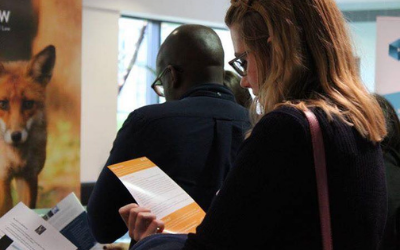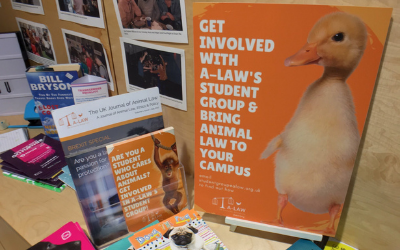Legal Advisory Group on Extreme Conformation in Dogs
Working towards a legal framework for responsible dog breeding.
Our vision is a world where every domestic dog is born free from extremes of conformation that harm their health and welfare.
Overview
The Legal Advisory Group on Extreme Conformation in Dogs (LAGECDogs) are a multi-disciplinary sub-group situated within the UK Centre for Animal Law (A-LAW). We apply our legal, scientific and welfare expertise to the creation of a more effective legal and policy regime in the UK to protect domesticated dogs from conformation-related suffering. Our LAGECDogs research and analysis address the capacity of current and future legal frameworks to protect dogs from the harms resulting from selective breeding for conformational extremes, with much of our early work focused on the legal and welfare issues around brachycephaly (short muzzle).
In our view, the current law and policy in the UK must do more to reverse the normalisation, and indeed, celebration of extreme conformation in dogs across UK society. Improvements in coverage, clarity and enforcement of the law would promote a greater understanding among purchasers, owners, breeders and the wider public of the basic key physical traits and biological functions needed by all dogs to protect their health and welfare. These traits include fundamental natural abilities of dogs to breathe, blink, sleep, exercise, mate and give birth naturally, as well as to exhibit evolutionary normal canine behaviours such as interacting with conspecifics, playing and maintaining their own hygiene.
Purpose
Our aim is to use the law to promote the breeding, purchasing, ownership and advertising only of dogs with innate good health, thereby reducing or preventing the suffering that arises due to conformational extremes or inherited conditions at every stage of a dogs’ life.
Our intention is to promote both more effective use of existing UK law and regulation in relation to extreme conformations in dogs and to also propose options for reform, where appropriate.
Scope
Our aim is to inform developments in law and policy related to dog health and welfare specifically in relation to extreme conformations. We are not a campaigning organisation. None of the statements or publications by LAGECDogs should be taken as constituting legal advice in any form. Any views and comments on these pages are solely LAGECDogs and the individual authors’ opinions and beliefs and should not be regarded as being attributable to any other organisation to which they may belong or be affiliated.
We focus on extreme conformation in dogs specifically but also recognise and acknowledge the substantial suffering caused by extreme conformation in other companion animal species, notably cats, rabbits and equines.
We address the law of the UK, but have a current focus on England.
Composition
We are a multi-disciplinary group comprised of lawyers, legal academics, veterinary professionals and animal welfare and behaviour scientists.
Current activities and outputs (updated October 2024)
Legal analysis of current law and policy
LAGECDogs produces legal analysis on the application of current law in the UK to stakeholder activities or policies that affect the breeding, purchasing, ownership or advertising of dogs with extreme conformation. Published legal analyses to date address the law in England and include:
i) Penalties for breeding dogs in breach of licensing conditions.
ii) Legal implications of the Kennel Club and University of Cambridge ‘Respiratory Function Grading Scheme’ in England.
Improving implementation of current law
LAGECDogs works with key stakeholders to improve compliance, monitoring and enforcement of existing legal obligations. Currently, we are working closely with APGAW to develop a practical ‘Innate Health Assessment’ tool to support local authority inspectors in evaluating the conformational health of each dog kept for breeding by licensed breeders to ensure compliance with existing animal welfare legislation. Once finalised, this tool will also assist the general public to better understand the legal and welfare implications arising from the conformation of any dog they might plan to acquire. Our anticipation is that all breeding dogs will be legally required to undergo the ‘APGAW Innate Health Assessment’ under existing dog breeding regulations in England, and that it will also prove useful across the UK.
Proposals for statutory reform
LAGECDogs also works in collaboration with other stakeholders on legislative reform. We consider the Animal Welfare Act 2006 requires reform to extend legal obligations to avoid breeding from dogs with extreme conformation to all breeders, not only those who fall under licensing regimes. We are currently developing these reform proposals alongside APGAW and others.

News
EFRA Inquiry update: The EFRA Select Committee has published its Pet Welfare & Abuse inquiry report. It calls for clearer guidance for enforcers of sch 6, para 6 of LAIAR; a public information campaign about the welfare issues associated with ‘designer pets’ to discourage their acquisition; regulation of canine fertility clinics via a new veterinary act; and, extension of LAIAR to cover male dogs kept for breeding, amongst other things.
Extreme breeding in Europe: Eurogroup for Animals has mapped legislation in Europe that exists to tackle extreme breeding and extreme features.
European Commission: The EC has proposed and consulted on new welfare and traceability rules for dogs and cats, which include a requirement for breeding establishments to be approved. Suggested welfare measures include a provision to “ensure that breeding strategies do not result in genotypes and phenotypes that have detrimental effects on the welfare of the dogs and cats, or of their descendants. “
The Supreme Court in Norway hands down judgment in dog breeding case. Read more: ‘Important victory for the dogs in the Supreme Court.’
Royal College of Veterinary Surgeons has updated its advice about canine artificial insemination to confirm that it regards both legal types to be acts of veterinary surgery. Read more here.
Brachy’s in the media. Dutch weigh law to ban cruelly overbred pets (msn.com) Article published on 22 June 2023 about a proposed ban on ‘possessing and advertising all pets with attributes proved to cause medical issues’.
Breed trends. Kennel Club registrations for the English Bulldog have risen from 4,782 in 2012 to 15,403 in 2021 (Kennel Club), and Pets4Homes data shows that French Bulldogs remained the most frequently advertised breed on the selling platform in (Pets4 Homes, 2022).
Legal journal article. Journal of Animal Law publishes article about the legal issues around extreme conformations and breeding. Read here

Stakeholder meeting – breeding extreme conformations in dogs
The Animal Welfare Act (AWA) is not fit for purpose in terms of safeguarding the welfare of dogs and their progeny; so was the unanimous conclusion of stakeholders attending a recent conference on the breeding and purchasing of dogs held by the All-Party Parliamentary Group on Animal Welfare (APGAW).
The event, run in conjunction with the University of Sussex and the UK Centre for Animal Law, was attended by leading members of the canine community, in addition to experts in the field of animal law, animal welfare enforcement and animal behaviour. Read full article.
Discover more about our work
Breeding dogs with impaired respiratory function (December 2024)
Read our analysis of the legal implications of breeding dogs with evidence of impaired respiratory function under the Respiratory Function Grading Scheme (RFGS). View our accompanying infographic here.
Penalties for breeding dogs in breach of LAIAR (March 2024)
Read our analysis of the current penalties for breeding dogs in England without a licence or in breach of licence conditions.

Written evidence to EFRA Committee (2023)
Read our written evidence to the EFRA Committee Pet Welfare and Abuse Inquiry addressing harmful conformations. All written submissions to the Committee on this issue can be found here.

Written submissions to DEFRA (2023)
Read our written submissions to DEFRA about the effectiveness of The Animal Welfare (Licensing of Activities Involving Animals) (England) Regulations 2018 in relation to dog breeding.

Our open response to a student question about dog breeding
We were recently contacted by a student of further education who wrote ‘I’m struggling to find relevant court cases. Is it the case that very few people are taken to task about their breeding methods because it’s perhaps a relatively new problem, or is it just too difficult to get to that point?’ Read Dr Helena Howe’s open response.
Listen to Dr Helena Howe’s podcast
The English Bulldog is on trial in Norway. The future of the Bulldog hangs in the balance as the Norwegian Supreme Court decides whether breeding of this much-loved breed should be banned. The dogs have done nothing wrong; the fault lies with us. We may find extreme physical features like big eyes, very flat faces or deep skin folds on dogs cute but these traits can cause our dogs to suffer throughout their lives. In the UK we claim to be a nation of animal lovers. Yet we are breeding and buying dogs for their looks despite the evidence of harm. What is the cause of this problem and what should we do about it? Dr Helena Howe explores how the case for a ban reached the Norwegian Supreme Court and talks to leading experts in the field about how the law can help us to help dogs.
Meet the committee
Chairperson

Dr Helena Howe is a Senior Lecturer in Law at the University of Sussex. Her research lies at the intersection of Environmental Law, Animal Law and Agricultural Law. Her current work focuses on breeding and ownership of dogs with extreme conformations, farmed animal welfare and the development of Earth law.
Disclaimer
Whilst the information on this website has been carefully prepared, it does not constitute legal advice. This publication should not be used or relied upon and you should not act or refrain from acting, upon the information contained within this publication.
A-LAW, its trustees, volunteers and agents do not accept or assume any responsibility or duty of care in respect of any use of or reliance upon this publication. Accordingly A-Law does not accept any liability for any loss arising from any action taken or not by any person in reliance on this publication or any part of it.








